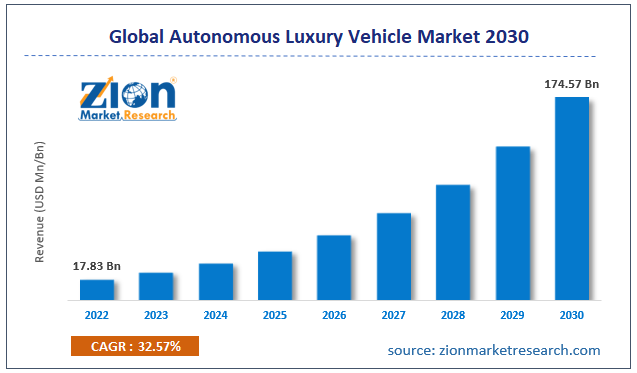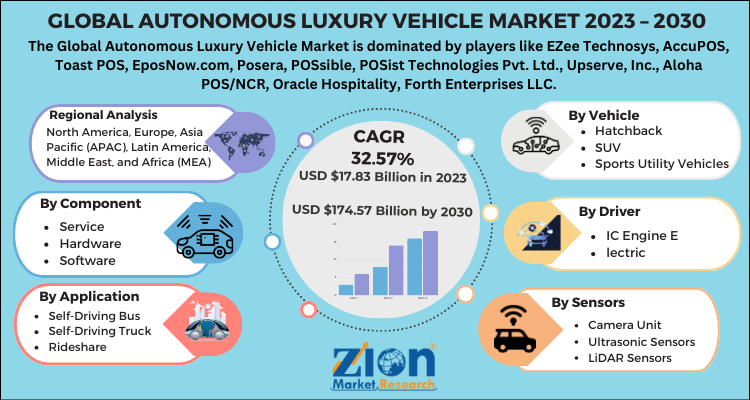Autonomous Luxury Vehicle Market Size, Share, Trends, Value 2030

Autonomous Luxury Vehicle Market By Automation [Level 5, Level 4, and Level 3], By Component [Service, Hardware, and Software], By Application [Self-Driving Bus, a Self-Driving Truck, Rideshare, Ride-Hail, Robo Taxi, and Civil], By Vehicle [Hatchback, SUV, and Sports Utility Vehicles], By Driver [IC Engine and Electric], By Fuel [Battery Electric Vehicle (BEV), Internal Combustion Engine (ICE) Vehicle, Hybrid (HEV & PHEV), and Fuel Cell Electric Vehicle (FCEV)], By Sensors [Camera Unit, Ultrasonic Sensors, LiDAR Sensors, Radar Sensors, and Biometric Sensors], By End User [Personal Mobility and Car-Sharing], And By Region - Global And Regional Industry Overview, Market Intelligence, Comprehensive Analysis, Historical Data, And Forecasts 2023 - 2030-
| Market Size in 2022 | Market Forecast in 2030 | CAGR (in %) | Base Year |
|---|---|---|---|
| USD 17.83 Billion | USD 174.57 Billion | 32.57% | 2022 |
Description
The global autonomous luxury vehicle market size was evaluated at $17.83 Billion in 2022 and is slated to hit $174.57 Billion by the end of 2030 with a CAGR of nearly 32.57% between 2023 and 2030.
The market report is an indispensable guide on growth factors, challenges, restraints, and opportunities in the global marketspace. The autonomous luxury vehicle industry report covers the geographical market along with a comprehensive competitive landscape analysis. It also includes cash flow analysis, profit ratio analysis, market basket analysis, market attractiveness analysis, PESTEL analysis, SWOT analysis, Porter’s five force analysis, and value chain analysis. Additionally, the report explores the investor and stakeholder space to help companies make data-driven decisions.
Global Autonomous Luxury Vehicle Market: Overview
The autonomous vehicle is also referred to as a self-driving vehicle that uses light detection & ranging (LiDAR), artificial intelligence software, and RADAR sensing technology to monitor the distance of about 60-meter range around the car and design an active 3D map of the live location. The autonomous vehicle can travel between different destinations automatically without human intervention. They integrate the software with sensors to navigate, control, and handle the vehicle. Most self-driving vehicles develop an internal map of the surrounding environment on the basis of a wide array of sensors such as radar. These vehicles ensure mobility, safety, and driving satisfaction.
Global Autonomous Luxury Vehicle Market: Growth Factors
There is a significant spike in the tangible luxury offerings in automobiles due to the consumers’ inclination toward more comfortable and advanced featured vehicles. The shift in preference of people from sedans to SUVs due to the growing disposable income of the people boosts the global autonomous luxury vehicle market. Increasing awareness among the consumers regarding adopting the safe and productive mode of driving is further fueling the global autonomous luxury vehicle market. The modern and hectic life of people especially in the developed region is inducing people to adopt autonomous vehicles to save time. The growing traffic zones are significantly contributing to the growth of the global autonomous luxury vehicle market. The growing rules and regulations of the government owing to the passenger safety and surge in the cases of road accidents are proliferating the global autonomous luxury vehicle market growth.
The increasing mandates from the government such as the anti-lock braking systems and driver assistance systems further expand the market. However, the increasing demand for the cost-effective autonomous vehicles system is anticipated to propel the market growth significantly. The growing aggressive efforts of the manufacturers to improve the driving experience and product portfolio have projected the market to grow significantly during the forecast period.
The growing per capita income of people in developing countries bolsters the market growth.
The increasing investment in research and development in autonomous vehicles is boosting the growth of the global market. The integration of dynamic mobile applications with the autonomous vehicle is attracting the customers to adopt highly advanced technology. Moreover, the emergence of smart cities and the proliferation of connected vehicle technology integrated with the internet of things (IoT) & robotics assistance further bolster the market growth.
Global Autonomous Luxury Vehicle Market: Segmentation
The global autonomous luxury vehicle market can be segmented into automation, component, application, vehicle, driver, fuel, sensors, end-users, and region.
By automation, the market can be segmented into level 5, level 4, and level 3.
By component, the market can be segmented into service, hardware, and software.
By application, the market can be segmented into the self-driving bus, a self-driving truck, rideshare, ride-hail, Robo taxi, and Civil.
By vehicle, the market can be segmented into the hatchback, SUV, and sports utility vehicles. Among these, the SUV segment holds the hegemony over others due to the growing demand for luxury vehicles.
By driver, the market can be segmented into an IC engine and electric.
By fuel, the market can be segmented into battery electric vehicle (BEV), internal combustion engine (ICE) vehicle, hybrid (HEV & PHEV), and fuel cell electric vehicle (FCEV). The battery-electric vehicle (BEV) segment holds the largest share in the global autonomous luxury vehicle market.
By sensors, the market can be segmented into the camera unit, ultrasonic sensors, LiDAR sensors, radar sensors, and biometric sensors.
By end-users, the market can be segmented into personal mobility and car-sharing.
Autonomous Luxury Vehicle Market : Report Scope
| Report Attributes | Report Details |
|---|---|
| Report Name | Autonomous Luxury Vehicle Market Research Report |
| Market Size in 2022 | USD 17.83 Billion |
| Market Forecast in 2030 | USD 174.57 Billion |
| Growth Rate | CAGR of 32.57% |
| Number of Pages | 212 |
| Key Companies Covered | Cisco Systems, Renesas Electronics, ZF Friedrichshafen, Magna International, Valeo, Texas Instruments, Infineon Technologies, NXP Semiconductors, Denso, Delphi Automotive, Robert Bosch, Continental, Baic Motor, Waymo, Saic Motor Corporation, Baidu, Changan Automobile, Tesla, Porsche, Daimler, and BMW. |
| Segments Covered | By Automation, By Component, By Vehicle, By Application, By End-Use, By Driver, By Fuel, By Sensors and By Region |
| Regions Covered | North America, Europe, Asia Pacific (APAC), Latin America, Middle East, and Africa (MEA) |
| Base Year | 2022 |
| Historical Year | 2017 to 2021 |
| Forecast Year | 2023 - 2030 |
| Customization Scope | Avail customized purchase options to meet your exact research needs. Request For Customization |
Global Autonomous Luxury Vehicle Market: Competitive Players
Some of the key players in the global autonomous luxury vehicle market are Cisco Systems, Renesas Electronics, ZF Friedrichshafen, Magna International, Valeo, Texas Instruments, Infineon Technologies, NXP Semiconductors, Denso, Delphi Automotive, Robert Bosch, Continental, Baic Motor, Waymo, Saic Motor Corporation, Baidu, Changan Automobile, Tesla, Porsche, Daimler, and BMW.
Global Autonomous Luxury Vehicle Market: Regional analysis
North America holds the largest share in the global autonomous luxury vehicle market owing to the surge in the sales of luxury automobiles. The growing government regulations regarding the installation of the smart driver safety system further fuels the regional market growth.
Europe is a growing region in the global market due to the intensifying investments in research and development activities. However, the region is known to be the global hub for the luxury automobile market.
Asia Pacific is anticipated to witness huge growth during the forecast period due to the growing technological advancements and the presence of some prominent players in the region.
The global autonomous luxury vehicle market is segmented as follows:
By Automation
- Level 5
- Level 4
- Level 3
By Component
- Service
- Hardware
- Software
By Application
- Self-Driving Bus
- Self-Driving Truck
- Rideshare
- Ride-Hail
- Robo Taxi
- Civil
By Vehicle
- Hatchback
- SUV
- Sports Utility Vehicles
By Driver
- IC Engine E
- lectric
By Fuel
- Battery Electric Vehicle (BEV)
- Internal Combustion Engine (ICE) Vehicle
- Hybrid (HEV & PHEV)
- Fuel Cell Electric Vehicle (FCEV)
By Sensors
- Camera Unit
- Ultrasonic Sensors
- LiDAR Sensors
- Radar Sensors
- Biometric Sensors
By End-Users
- Personal Mobility
- Car-Sharing
Global Autonomous Luxury Vehicle Market: Regional Segment Analysis
- North America
- The U.S.
- Canada
- Europe
- France
- The UK
- Spain
- Germany
- Italy
- Rest of Europe
- Asia Pacific
- China
- Japan
- India
- South Korea
- Southeast Asia
- Rest of Asia Pacific
- Latin America
- Brazil
- Mexico
- Rest of Latin America
- Middle East & Africa
- GCC
- South Africa
- Rest of Middle East & Africa
What Reports Provides
- Full in-depth analysis of the parent market
- Important changes in market dynamics
- Segmentation details of the market
- Former, on-going, and projected market analysis in terms of volume and value
- Assessment of niche industry developments
- Market share analysis
- Key strategies of major players
- Emerging segments and regional markets
- Testimonials to companies in order to fortify their foothold in the market.
Table Of Content
FrequentlyAsked Questions
An autonomous luxury vehicle is a type of vehicle that combines the features of autonomous or self-driving technology with high-end luxury features and amenities. These vehicles are designed to provide a premium and comfortable driving experience while also offering self-driving capabilities, allowing occupants to relax or work during their journey without the need for constant human intervention.
Improvements in autonomous driving technology, such as sensor systems, artificial intelligence algorithms, and connectivity, are crucial for the growth of the market. Breakthroughs in these areas can enhance the safety and performance of autonomous luxury vehicles.
Global Autonomous Luxury Vehicle market size at $17.83 Billion in 2022 and is hit $174.57 Billion by the end of 2030.
The global autonomous luxury vehicle market is anticipated to record a CAGR of nearly 32.57% from 2023 to 2030.
North America holds the largest share in the global autonomous luxury vehicle market owing to the surge in the sales of luxury automobiles. The growing government regulations regarding the installation of the smart driver safety system further fuels the regional market growth.
Some of the key players in the global autonomous luxury vehicle market are Cisco Systems, Renesas Electronics, ZF Friedrichshafen, Magna International, Valeo, Texas Instruments, Infineon Technologies, NXP Semiconductors, Denso, Delphi Automotive, Robert Bosch, Continental, Baic Motor, Waymo, Saic Motor Corporation, Baidu, Changan Automobile, Tesla, Porsche, Daimler, and BMW.
HappyClients
Zion Market Research
Tel: +1 (302) 444-0166
USA/Canada Toll Free No.+1 (855) 465-4651
3rd Floor,
Mrunal Paradise, Opp Maharaja Hotel,
Pimple Gurav, Pune 411061,
Maharashtra, India
Phone No +91 7768 006 007, +91 7768 006 008
US OFFICE NO +1 (302) 444-0166
US/CAN TOLL FREE +1 (855) 465-4651
Email: sales@zionmarketresearch.com
We have secured system to process your transaction.
Our support available to help you 24 hours a day, five days a week.
Monday - Friday: 9AM - 6PM
Saturday - Sunday: Closed







